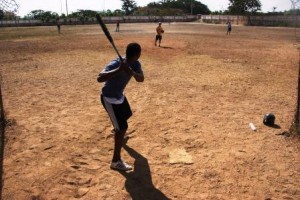 Aaron Roth – Edify.org – “Family Experience Camp” – July 2014
Aaron Roth – Edify.org – “Family Experience Camp” – July 2014
I’m back in Lima, Peru after almost five weeks in the Dominican Republic (DR). The weeks in the DR seemed to fly by very quickly because after the first week with two colleagues from ADRA Peru (our Peruvian partner), I headed to the eastern part of the island to work with the Edify Family Experience Camp for the following three weeks. It’s a really quick turnaround from week to week because we drop off families and pick others up at the airport in addition to working in three different schools in La Romana, DR.
Between week 2 and 3 I flew home for my dad’s retirement celebration. We celebrated his 34 years in the pastorate and 19 years at the Linville Creek congregation in Broadway, VA. As you can imagine, it’s nice to be back in Lima, Peru not having to travel for awhile. The following newsletter is about the three weeks of the Edify Family Experience Camp of 2014. -Aaron
- Download this email as a pdf: Aaron Roth – July 2014 Update.pdf
- Edify worldwide – www.Edify.org
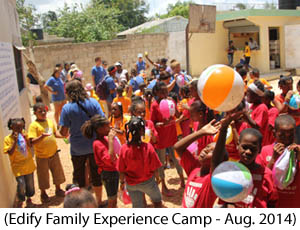
- Archive: AaronRoth.net – Monthly Newsletters
Our purpose for having these family experience camps is to bring families from the US closer to the realities of the areas of economic poverty where we work and to celebrate with a few schools in our loan and training program in the Dominican Republic. We call our trip more of a “Vacation with a Purpose” instead of a “Mission Trip” because the week is geared toward a relaxed family environment where we spend part of the day in the school with children and part of the vacation time doing a book study using “When Helping Hurts” by Steve Corbett and Brian Fikkert.
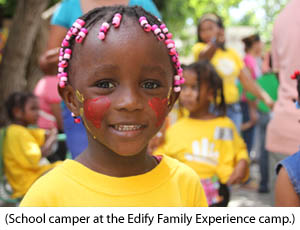 By having the ability to experience different economic realities during the day and discussing these differences using a technical guide, we allow guests to learn the theory at night and see it in practice during the day. I believe this is very important for our guests – including our staff – because when you have an open discussion on what works vs. what doesn’t, and what helps vs. what hurts, everyone benefits and we reduce the tendency to think of ourselves as superior, wealthier Americans with a lot to give and foreigners who are just waiting to receive.
By having the ability to experience different economic realities during the day and discussing these differences using a technical guide, we allow guests to learn the theory at night and see it in practice during the day. I believe this is very important for our guests – including our staff – because when you have an open discussion on what works vs. what doesn’t, and what helps vs. what hurts, everyone benefits and we reduce the tendency to think of ourselves as superior, wealthier Americans with a lot to give and foreigners who are just waiting to receive.
Instead, we’re able to sit at a common table where all of us see our areas of poverty: relationships, time, value, unhappiness and distance from God, and we seek solutions to alleviate these areas of poverty. We are very well aware that any form of development takes much longer than a week, including the development of a new perspective, so we really try to encourage guests to come with an open mind and plenty of flexibility, so that the Lord will show us what He desires we see. I like this laid-back approach much 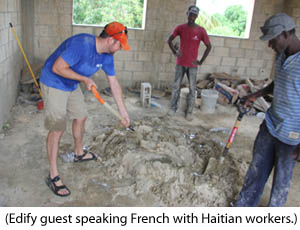 better than trying to mandate the feelings or conclusions people come away with.
better than trying to mandate the feelings or conclusions people come away with.
When you push and you pressure, it’s less fun and less effective, so really what it comes down to is being open to see what God has for the week, and naturally relationships will form and flourish in that environment. In a way, we can learn how we can better treat the people we work and live at home by experiencing another culture.
Our theme for this past summer was a verse from the parable of the “Good Samaritan” in Luke where a man responds to Jesus’ question regarding what he must do to inherit eternal life:
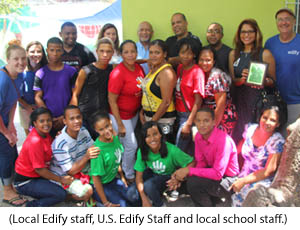
He answered, “‘Love the Lord your God with all your heart and with all your soul and with all your strength and with all your mind’; and, ‘Love your neighbor as yourself.'” (Luke 10:27 NIV)
Each day we try to instill more applications of the principles in the verse to the students in the family camp. After each week, each participant collects their own stories from the previous week. Here are a few stories that I took away from family camp this past summer that demonstrated what it means to love your neighbor as yourself.
Ruth & Esmerelda
In the first week of family camp, we worked inside a school called, “Paso a Paso” or “Step by Step.” I remember meeting Haidy, the director, over two years ago when we promoted business training for schools in La Romana, Domincan Republic. She is a mother of a special needs child and when she saw that no public school was giving him the attention he needed to develop, she created her own school to attend to students with certain development needs.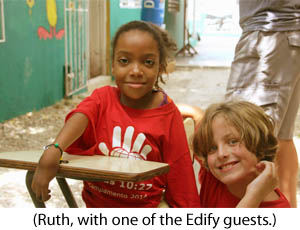
Now, more than 10 years later she has a school with over 100 children that come to receive a great Christian education, and not all the students are special needs, but it is quite amazing to witness how the other classmates treat the students with special needs.
Ruth, who has limited functioning in her hands and arms, and very limited ability in her legs, sits and draws with the other students in her class. When she needs to move to a new classroom, a student will pick her up, and when she needs to go to the bathroom a teacher or the director will help her. She’s quite intelligent and social, and is probably a little timid given her inability to run around with the other kids, but regarding timidity we could of course chalk that up to the fact she’s a 4th grader.
Meet Esmerelda, she’s just as sassy as any other six year-old Dominican girl. She wants to be a part of everything. Every game, every activity and every photo. You’ll take a photo, show it to her, she’ll shriek that it’s not her best, so you’ll have to take another one. At times, you can say 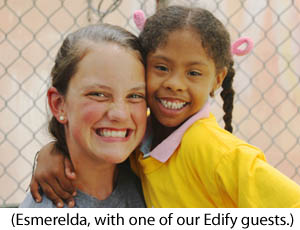 she needs a bit more management because she has Down’s syndrome, but you could also say she’s tuckered out from being around so many people she wants to meet.
she needs a bit more management because she has Down’s syndrome, but you could also say she’s tuckered out from being around so many people she wants to meet.
Ruth and Esmerelda are treated like their other classmates. Do you know how profound that is for a country that is still in its “developing” status? They are accepted and loved like they weren’t any different from the others – and hey, aren’t we all a little different anyway?
Willie and the Car Workshop
One day, after a few school visits, one of our transport vans didn’t start up. We loaded the rest of the guests into the other vehicles and they headed back home while I met up with a local mechanic to go see what we could do about the problematic van. I was dropped off at his workshop which was mostly a small parking lot with some temporary canvas awnings blocking the heavy sun off the workers. I counted about five mechanics ranging in age from 18 to 50 and two more young teenagers. 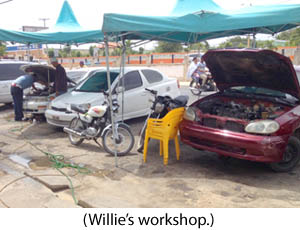
As I stood there for about half an hour waiting for Willie to clear some time in his schedule to go visit the distressed van, I got to see the local operation of his car repair business. I must have seen seven or eight different conversations or transactions between the mechanics, delivery men and other visitors. I felt like I was in the middle of some shipping docks with a few ships of different shapes and sizes arriving and leaving at the same time, offloading goods, boarding passengers, repairing components and asking technical questions. I was amazed that no person nor transport collided; Willie had it all under control.
Finally we set sail for the van, and I got the chance to ask Willie about his fleet of workers. “ . . . and what about the two young men, do they work for you permanently?
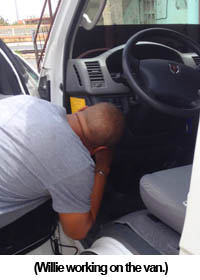
“Well, half the time. They are in school during the year, so I only let them work with me half a day. They are crazy about learning about engines and components and repair. If it were up to them they’d sleep in the workshop. I told them they need to be in school. I won’t hire them full-time until they finish school. That’s the deal.”
I saw not only why Willie was a great manager, but also why he was a great man. Someone treated him just like he’s treating these young men: with guidelines and a gentle strictness to a good principle. Someday they’ll thank him when they are managers of their own repair shop yelling at young workers to stay on schedule or grab some parts from a supplier. They’ll see that he had their destiny in mind the whole time.
La Familia Ortiz
After a total of six family camps I am pretty sure that the oldest group, ages 12-13, is where I belong. Not because this is my actual maturity level, but because they are older and you can have real conversations with them. I normally refer to them as “Los Verdes” or “The Greens” because of the shirt color we give them, but I normally give them an option of choosing a new name. I try to convince the boys that they should think about really manly titles like “Little Rabbits” or “The Flowers.” They don’t usually go for those, so this year when I had the greens one week it was “The Disciples” and the other was “La Familia Ortiz.”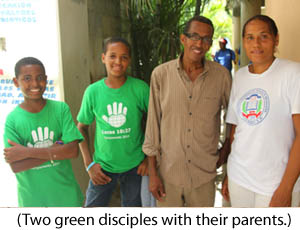
One of my common topics in newsletters come from the “things I don’t get used to” and how the green group chose “La Familia Ortiz” has its roots in that. I find that the young guys are really keen on knowing who I am and what I think about a variety of topics. It’s like they are looking not just for an older brother, but a positive male leader. I don’t think I’ll get used to hearing the young men tell me that their father left at such a young age, or they’ve never met him, or they only know him when he flies in by night usually with alcohol on his breath. I definitely am not used to that. I try to be different; I try to be a better man than they’ve known, even if it’s for a week.
The school we worked with told all the students that we were friends of the school, and these Americans were really more like uncles and aunts than guests. So with that warm introduction, they wanted to know who I am what I think about their community and if I’ve thought I could ever live in the Dominican 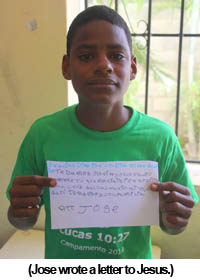 Republic for a long time. They want to connect, so they asked me what my last name is to find their uncle, me, on Facebook. I joke with them that I don’t know it, and when I ask for suggestions for last names I ask them who some famous Dominican baseball players are.
Republic for a long time. They want to connect, so they asked me what my last name is to find their uncle, me, on Facebook. I joke with them that I don’t know it, and when I ask for suggestions for last names I ask them who some famous Dominican baseball players are.
After hearing a few examples I say, “Oh yeah, Ortiz! That’s it!”
They respond in disbelief, “Aaron Ortiz! Seriously? You’re Aaron Ortiz!?”
“Yes, so with a more Dominican last name I guess that makes us a little more like family right?”
“Yes! La Familia Ortiz!”
“Well, what do families do here?”
“We get together and have big meals. Big barbecues, everyone is invited.”
“I think that sounds like a fantastic idea.”
“Aaron, when you come back we should all have a big bbq for La Familia Ortiz!”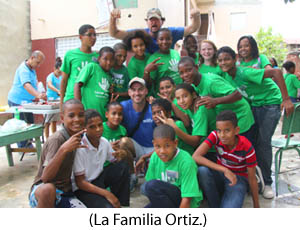
It crushes me each time when I think about how “coming back” is a promise that will be very difficult to fulfill, so I tell them that our organization works with the schools directly, and we have a lot of schools in the program in the DR, so really we are all family. So when we get together as believers in one faith, we get to celebrate with family. It doesn’t matter the country, the community, the language or the skin color. We’re all family.
They loved it. Every time we had to round up the groups, they shouted, “La Familia Ortiz! La Familia Ortiz!”
On the last day, they shouted that we needed our family photo. Many kids wanted individual photos with Uncle Aaron Ortiz. It was so fun. But then of course comes the part where the young men show their weakness. The same young men who tell me their stories, don’t just ask me, but really want to know, “So you’ll come back right? You’ll come back here for the bbq?”
What do you say to something like that? Normally, I’d say, “If it’s soon, or if it’s later, you know we’re still La Familia Ortiz right?” They smile and shake my hand, “Sí, somos de la Familia Ortiz.” (We are the Ortiz Family.)
Bernie and His Older Brother
One of our guests at Family Camp, a long-time Texas Rangers fan, and current little league coach, suggested to me that we should try to play a pick-up game with Bernie, a student from the school, and his friends. He had an eagerness in his request not just that he was interested in seeing the talent of Bernie, but that he and his son would enjoy a more personal connection with local students in a common passion for baseball.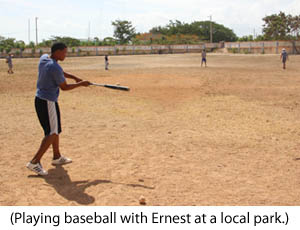
We made the arrangements during the breaks of family camp with Bernie and assured him that we’d come ready to play, and yes, of course his older brother could come to. But why was Bernie so insistent on his older brother participating? As it turns out, Ernest, now 20 years old, just three years ago was selected into the development academy for the Baltimore Orioles, but unfortunately, on the day he was to sign his contract for a triple A team in the U.S., an all too common story occurred – they simply didn’t have room and he was dropped from the roster.
So on Thursday afternoon there we were, four Americans, with Bernie and friends catching fly balls and turning double plays in the scorching Dominican heat on a rocky and grass-barren field just outside the local stadium. What was amazing to note was that his older brother, Ernest was indeed talented, a true natural, but what impressed us most was his father-like care for his younger brother. I spent some time talking with Ernest asking him about his plans. He told me that he’s still playing baseball, and is hopeful to get picked up again by some scouts, yeah, he’s working a little bit, and really he should finish his degree soon.
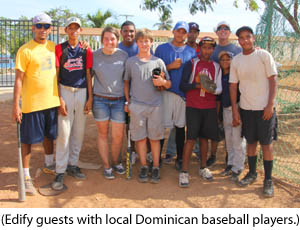 I asked him about what he thought of his younger brother, “You know, he’s the real natural. When he gets his growth spurt, I think he’s got potential. But I don’t want him to go down the road I did. I want him to have a better future. I want him to finish school first.”
I asked him about what he thought of his younger brother, “You know, he’s the real natural. When he gets his growth spurt, I think he’s got potential. But I don’t want him to go down the road I did. I want him to have a better future. I want him to finish school first.”
I played that conversation over in my mind, and a question stood out to me: “What do we leave, when we leave the island?” Do we come to see the sights and sounds and taste the local flair, and applaud the talented youth? Because we will come, and we will go, that much is true. But what impact will we make with our time, with our resources, with our energy? To a young man, who had seen the real promise of a dream on ink and paper, and in one day seen it taken all away, I see that he desires the surest route for a better future for his younger brother.
That I believe is what he wants us to cheer for, that is what he hopes we will bring to the island and how we will treat our Dominican neighbors.
—–
I pray that you’ve been having an enjoyable summer and have had the opportunities to be involved in your community. Please pray for us here in Lima, Peru as we continue to implement the Edify school loan and training program.
Blessings,
-Aaron

